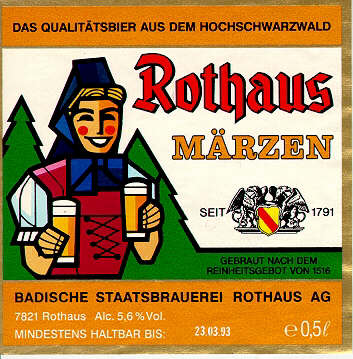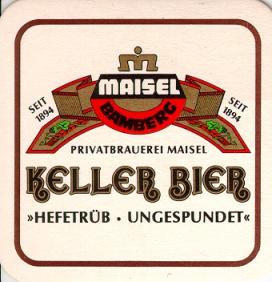The Reinheitsgebot, the oldest consumer protection law and a guarantee of beer quality. An example to the world of how beer should be brewed, as the Germans have done for centuries. Well, not really. These are a few of the myths I would like to expose. Everyone thinks that they know what the Reinheitsgebot is and mostly consider that's it's pretty groovy. This is an attempt to have an objective look at what can be a very emotive subject.
Now, some people may be a little shocked and perhaps even outraged by
the title of this page so a few words of explanation first. German beer,
generally, is brewed to a very high standard, one which of the rest of
the world rightly envies. Unfortunately, many people seem to get confused
about the reasons for the high quality of German beer. As far as I can
tell, the Reinheitsgebot is totally irrelevant; German beer is good because
German brewers are highly skilled and make their beer with pride and care.
 The
DDR - who needs a Reinheitsgebot?
The
DDR - who needs a Reinheitsgebot?
That it is also possible to do this without the limitation of only using
malt, water, hops and yeast has been proved by many, including some in
Germany itself. The scorn heaped upon beer from the DDR - mostly because
of the supposedly inferior brewing standards - I find totally unjust and
mostly based upon pure prejudice. How many West Germans, who will happily
tell you how undrinkable DDR beer was while sipping a delicious glass
of Oettinger, ever actually drank in an East German pub? Very few.
I can well remember being in the DDR at the time when West German beer
first became available. What surprised me were how much worse
the imported beers were than the supposedly inferior DDR counterparts.
I couldn't understand how anyone could prefer these expensive, tasteless
beers over their own local, flavourful brews. Well, as time has shown,
they didn't. Even before the reintroduction of the Reinheitsgebot in the
East, people had gone back to their old favourites. Anyone who compared
the washing-up water blandness of Eschwege Pils with the wonderful Mühlhausener
Pilsator would know why: the DDR beer simply tasted better.
 What
is pure?
What
is pure?I realise that this is a controversial view because many, including some who really should know better are hypnotised by the 'pure' beer argument and find it hard to believe that beer with other ingredients can not only be just as pure, but also taste just as good. A crap, money-grubbing commercial brewery will manage to brew bland rubbish either within or without the constraints of the Reinheitsgebot. The problem is, that concentration on this limited list of ingredients as the core of beer quality allows compromise in many other key areas.
For me, the discussion should concentrate more around the factors which are truly crucial to the taste of a beer: the quality of the ingredients, lagering times, pasteurisation, filtration and carbonation. I think it has been all to easy for many German breweries, and not only the large ones, to gloss over the introduction of dubious techniques by insisting that they still brewed 'pure' beer.
Sorry, but I'm afraid that I find it hard to accept that a filtered, pasteurised beer, given a quick glance at the cellar and then shipped out to the unwitting or uncaring customer is a 'pure' beer, solely because only malt was in the grist. I'm not advocating huge amounts of adjuncts in the mash tun, but I know that while I may not be able to notice if a beer contains 5% non-malt in the grist, I can certainly tell if it hasn't been lagered long enough. For me this is the only thing that matters; how does it taste.
As long as it tastes good and doesn't have anything harmful in it, the brewers should be allowed to use whatever ingredients they choose. You only have to look a Belgium to see how far the frontiers of what is considered beer can be pushed back. The simple insistence that all their beer is good because it is 'pure' has been very convenient for any German brewer wanting to cut corners, lower production costs, but still maintain that they are providing a top-quality product.
 How
good is German beer?
How
good is German beer?
Let's be honest about this; there's lots of crap beer brewed in Germany.
There is also a large amount of very good beer produced, but to insist
that all German beer is good is evidently ridiculous. Not all British
beer is good, not all Belgian beer is good, not even all Czech beer is
good.
From the caramelly, boiled-sweet flavour of a mass-produced alt through
a soapy, sweetish helles to a one-dimensional pils that tastes like lemonade
with added hop-extract, there are plenty of uninspired or downright unpleasant
beers.
On the other hand, the pub-brewed altbiers of Düsseldorf as some of the
finest examples of top-fermented beers to be found anywhere in the world.
A Franconian unfiltered kellerbier is a revelation to anyone thinking
that bottom-fermented beers could never rival ales for subtlety and complexity
of flavour. A Bavarian weizen, with its bouquet of spices - coriander,
cloves, banana even - can confound the limitations of its ingredients
and achieve flavours straight from the spice mill. There is much diversity
and much to be very proud of in the German brewing world.